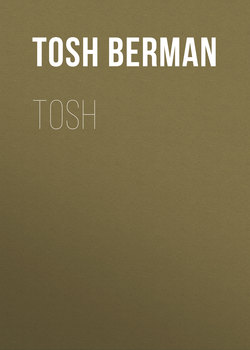Читать книгу Tosh - Tosh Berman - Страница 5
На сайте Литреса книга снята с продажи.
preface by Amber Tamblyn
ОглавлениеFor as long as I can remember, my parents’ Los Angeles apartment has harbored a collection of iconic art. Their home is stuffed with the rusted, burned, patina-patterned works of art from some of the greatest American visual artists of the 20th century. In their office, a variety of wild works cover the walls: the George Herms piece made of mangled white wire, glued to a water-stained plank of wood; the Bruce Conner mélange of black ink prints, popping off the white paper like a bevy of baby Rorschachs; my father’s own vibrant assemblages of electrified planets orbiting a blackened, blizzard sky. There are the fine photographs of Dennis Hopper and the fine arts of Dean Stockwell. On the glass book shelves are the books of poetry by Michael McClure and Jack Hirschman’s handbound chapbooks. And beneath it all, in a silver frame, a photo of a man sits on a wooden table as if the art above him were thought bubbles. The man has long hair and a long beard and looks straight out at you, his hand placed on a rock with a letter from the Kabbalah emblazoned on its surface. His gaze is gentle, his eyes as soft as a baby’s palm. This man is Wallace Berman.
I was very young the first time I ever asked about the man in the silver frame. Who was he? A guru? A hippie? A friend? An artist? A father? A visionary? A revolutionary? It turns out he was all of these things plus one more: a victim of a drunk driver. When I first asked my dad about his friend Wallace, his eyes softened and he made the kind of physical closure one does with a well of untapped pain: He clasped his hands across his chest, crossed his bony dancer legs, and looked down to the floor. “Wallace,” he said, “was everything.”
To my father, Wallace was a brother. Wallace was a mentor to an entire world in which my father and other artists like him lived. In 1976, at the age of 50, Wallace was killed by a drunk driver in Topanga Canyon, a moment that permanently broke my father’s heart. My father once told me the story of the night he ran into Wallace’s killer at a local Topanga bar. And while that’s a story for my father to tell someday, it bears noting here that he applied what Wallace had taught him that night, in a testament to Wallace’s spirit: Cut your enemies down with love.
Wallace was a purveyor of love, a seeker of love, and a maker of love. Love was in his marrow, and poets, filmmakers, painters, and dancers flocked to him. He was the frontman of the era’s assemblage art movement, and his work has been revered, admired, and even copied by some of the most legendary artists of our time.
Of course, next to almost every heterosexual male artist who devotes himself to his work is a damn good woman who keeps the fires lit. Wallace’s wife Shirley Berman, a dancer and the subject of many of his pieces, is an incredible woman whose impact on Wallace was huge. If artists lived inside the world that was Wallace Berman, then Shirley was the sun around which he orbited. Shirley, the daughter of a traveling circus dancer, is a beacon of feminism in my view, as are most women who lived through the masculinity of that era. As Tosh writes so beautifully in this book, “At best, women were expected to be the backup in case the male fell apart.” These words still ring true for many women today.
One of the most stunning works of art Wallace and Shirley Berman made was their son, Tosh. While reading Tosh, I found such a tender kinship to his journey, one that parallels my own in many ways. We were both born and raised in Los Angeles, surrounded by a strong family structure and a similar mixture of eclectics and eccentrics from around the world. Tosh and I grew up around junk artists, Beat poets, and musicians who would some day become rock ’n’ roll legends, everyone from Ed Ruscha to Neil Young. Through his father, Tosh was introduced to a world most could only hope to experience, and through my father’s connection to that legacy, so too was I.
I have much to thank Wallace and Shirley Berman for, as their mentorship and friendship with my father led to my own mentor and friend, the poet and activist Jack Hirschman. I was fortunate to grow up hearing Jack read his poems many times in my parents’ living room, and he became a powerful mentor for me. He inspired and urged me to write, nurturing my poetic and political voice from an early age, even publishing my very first poem when I was 11 years old. My work and life as a poet has run parallel to my work and life as an actress for over two decades, and the former very much informs the latter. I have my dad to thank for my relationship with Jack, who came to us from the world of Wallace Berman. I am forever grateful for that man in the silver frame, even though I never got to meet him.
After you read this compelling, glorious journey of growing up wild, free, and radical amongst some of the most fascinating people in America, you’ll be grateful for Wallace too.
